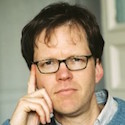Berlin Calling: History Colloquium with Paul Hockenos
01/01/1970
In a rare Monday installment of our Colloquium Series—and one that took the form of an interview led by MU Associate Professor of History Catherine Rymph—author and journalist Paul Hockenos was at the Kinder Institute on October 9 to discuss his most recent book, Berlin Calling, which tells the story of “the birth of the New Berlin” not through the familiar lens of WW II history and the high drama of its diplomatic aftermath, but instead by focusing on the subcultures that developed in both the East and West in the decades before the fall of the Berlin Wall.
Weaving between topics from legalized squatting to industrial music pioneers Einstürzende Neubauten, Hockenos painted the picture of a West Berlin that, by virtue of its being subsidized to the gills by western capital interests, had accrued a large enough crew of draft evaders and “brilliant dilettantes” by the late 1970s that it essentially operated as an alternate universe. Specifically, it was a city in which free universities, transportation, health care, and occasionally rent produced the freizeit (free time) and freiraum (free space) necessary for the simultaneous development of numerous subcultures: a thriving punk rock scene, a burgeoning gay community, and a virtual army of Frankfurt School Marxist grad students (to name only a few). While the West showed little interest in the East, Hockenos described how similar, and sometimes even stronger, movements were born out of the conditions on the other side of the “Death Strip.” Punk rockers in East Berlin, for example, saw their music less as a mode of political expression and more as a weapon to be used against an oppressive regime, an aggressiveness perhaps best captured by the “Church from Below,” a radical anarchist group that, in Hockenos’ telling, played a key (if rarely acknowledged) role in the Wall’s collapse.
Though developers’ dream of unified Berlin as a global center of finance never materialized, and though the subsidies West Berlin enjoyed largely dried up when the Wall tumbled, the city would continue on as a cultural mecca throughout the 1990s, as the remaining vestiges of freizeit and freiraum attracted a creative class that brought with it publishing houses, record labels, art galleries, and, eventually, start-ups. In wrapping up the interview portion of the talk, Hockenos touched on two collateral consequences of the rapid and drastic social, political, and economic change that the city underwent after the Wall fell: the inevitable gentrification of its distinct subcultures; and the rise of nationalist political groups whose resentment festered in the post-unification wake of skyrocketing unemployment rates and a disappearing social safety net.
For more information on Berlin Calling, including starred reviews from Booklist and Library Journal, click here.
 Paul Hockenos received his B.A. in Political Science at Skidmore College, and his M.A. in Social and Political Thought at University of Sussex, and he is a frequent contributor to the New York Times, the Chronicle of Higher Education, and Foreign Policy, among other publications. He is the author of numerous books including Berlin Calling: A Story of Anarchy, Music, the Wall, and the Birth of the New Berlin (The New Press, 2017); Joschka Fischer and the Making of the Berlin Republic: An Alternate History of Postwar Germany (Oxford University Press, 2007); and Homeland Calling: Exile Patriotism and the Balkan Wars (Cornell University Press, 2003).
Paul Hockenos received his B.A. in Political Science at Skidmore College, and his M.A. in Social and Political Thought at University of Sussex, and he is a frequent contributor to the New York Times, the Chronicle of Higher Education, and Foreign Policy, among other publications. He is the author of numerous books including Berlin Calling: A Story of Anarchy, Music, the Wall, and the Birth of the New Berlin (The New Press, 2017); Joschka Fischer and the Making of the Berlin Republic: An Alternate History of Postwar Germany (Oxford University Press, 2007); and Homeland Calling: Exile Patriotism and the Balkan Wars (Cornell University Press, 2003).
FEATURED EVENTS
03/13/2026
02/20/2026
02/13/2026
01/30/2026
